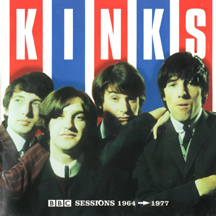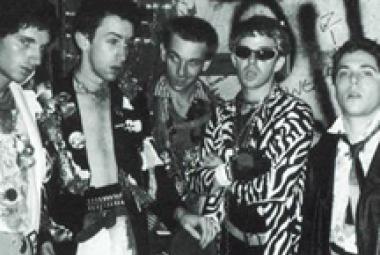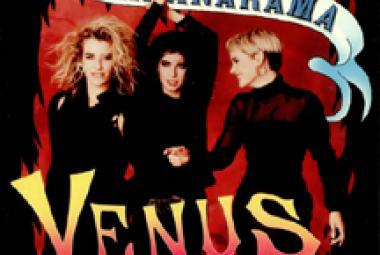The Kinks were an English rock band formed by brothers Dave Davies and Ray Davies with Pete Quaife in 1963. The band, which rose to fame during the mid-1960’s and were part of the British Invasion of the U.S., are recognized as one of the most important and influential rock groups of the era. Between the mid-1960’s and early 1970’s, the group gained a reputation for songs and concept albums reflecting English culture and lifestyle, fueled by Ray Davies’ observational writing style. Groups such as Van Halen, the Jam, the Knack, the Pretenders, and the Fall covered their songs, helping to boost the Kinks’ record sales. In 1990, the original four members of The Kinks were inducted into the Rock & Roll Hall of Fame, as well as the UK Music Hall of Fame in November 2005. (More from Wikipedia)
You can talk about your pioneers of rock and roll – Chuck Berry, Little Richard, Elvis Presley, James Brown, just to name a few – and you can even bring up your British Invasion greats – the Beatles, the Rolling Stones, the Animals, the Yardbirds, the Kinks, just to name another few. All of them are already in the Rock & Roll Hall of Fame, and deservedly so. However, you can play a lot of more modern rock records all day long and not really discern more than a hint of their direct influence; no question it’s in the DNA, but actual Elvis Presley-style vocals or Chuck Berry guitar licks or James Brown wails are elusive.
That is not so with Link Wray: His influence is front and center on a good 50% of the records that I play, because he is credited with introducing the “power chord” on electric guitar to rock and roll, a technique whose effect is often enhanced by distortion.
Writing for Allmusic, Cub Koda calls the power chord “the major modus operandi of modern rock guitarists”. I will spare you the technical details – not least because I don’t really understand them myself – but Ray Davies of the Kinks (in their classic “You Really Got Me”) and Pete Townshend of the Who (in “My Generation”) helped popularize the power chord in the early years of the British Invasion. When Townshend is performing his famous windmill guitar technique, he is typically playing power chords.
(February 2013)
* * *
One of the Kinks’ most popular recordings is their 1970 hit “Lola”; and from the very first line, it is clear that nothing is what it seems – “I met her in a club down in old Soho / Where you drink champagne and it tastes just like cherry cola”. Lola “walked like a woman and talked like a man” and – after dancing together “under electric candlelight” – “smiled and took me by the hand / And said dear boy I’m gonna make you a man”.
The final verse – “Well I’m not the world’s most masculine man / But I know what I am and I’m glad I’m a man / And so is Lola” – has all of the power and attitude and finality of someone “coming out”; yet even there, the singer doesn’t quite lay it all on the line with the final words: It is actually Lola who is glad that the singer is a man – s/he remains as mysterious as the androgynous Saturday Night Live character “Pat” (played by Julia Sweeney) whose romantic companion is “Chris” (originally played by Dana Carvey).
(March 2013)
* * *
Writing for the Rolling Stone Record Guide, David McGee states: “To get an idea of his indelible contribution to rock & roll, consider the critic Lester Bangs’ citation of [Ritchie] Valens as the prototypical punk guitarist whose signature ‘La Bamba’ riff links Valens to a hard-edged, no-frills style of rock & roll later advanced by the Kingsmen, the Kinks, the Stooges, and the Ramones.” The thrilling Ramones call “Hey Ho, Let’s Go” – from the opening song “Blitzkrieg Bop” on their first album, Ramones – might have been lifted directly from Ritchie Valens’ “Come On, Let’s Go”.
The Rolling Stones were from London, as were the Kinks, the Who and the Yardbirds. The Animals came from Newcastle, an industrial backwater like Liverpool, though on the opposite coast. The Hollies were formed in Manchester, though the bandmembers came from East Lancashire. The Moody Blues were from the Birmingham area; Birmingham, Alabama (one of the first major industrialized cities in the American South) is named for the British city.
(July 2013)
The Goldie and the Gingerbreads 1964 recording of “Can’t You Hear My Heartbeat” made it to #25 in the UK. Here in this country, Herman’s Hermits released “Can’t You Hear My Heartbeat” two weeks earlier; the heavy promotion of that song cut them out of the U. S. charts. After meeting Eric Burdon and the Animals, Goldie and the Gingerbreads was signed for a European tour, where they performed with the Who’s Who of the British Invasion: the Beatles, the Rolling Stones, the Animals, the Yardbirds, the Hollies, the Kinks, and others.
(October 2013)
* * *
Allmusic states the musical and historical importance of Ptooff! well in their entry by Dave Thompson: “Talk today about Britain’s psychedelic psyxties, and it’s the light whimsy of Syd Barrett’s Pink Floyd, the gentle introspection of the Village Green Kinks, Sgt. Pepper, and ‘My White Bicycle’ [by Tomorrow] which hog the headlines. People have forgotten there was an underbelly as well, a seething mass of discontent and rancor which would eventually produce the likes of Hawkwind, the Pink Fairies, and the Edgar Broughton Band. . . .
“But the deranged psilocybic rewrite of ‘Gloria’ which opens the album, ‘I’m Coming Home’, still sets a frightening scene, a world in which Top 40 pop itself is horribly skewed, and the sound of the Deviants grinding out their misshapen R&B classics is the last sound you will hear. Move on to ‘Garbage’, and though the Deviants’ debt to both period [Frank] Zappa and [the] Fugs is unmistakable, still there’s a purity to the paranoia.
“Ptooff! was conceived at a time when there genuinely was a generation gap, and hippies were a legitimate target for any right-wing bully boy with a policeman’s hat and a truncheon. IT and Oz, the two underground magazines which did most to support the Deviants ([Mick] Farren wrote for both), were both publicly busted during the band’s lifespan, and that fear permeates this disc; fear, and vicious defiance.”
(March 2014/1)
* * *
Many of the songs in the English Freakbeat Series were by musicians that became famous in later bands or in other contexts. The real attraction for the English Freakbeat, Volume 3 CD reissue though are three songs by a band called the Ravens; their bandleader Dave Davies and his younger brother Ray Davies were later in the Kinks, with Ray being the frontman and main songwriter for that stellar British Invasion group. Ray Davies was supposedly not involved in the Ravens at all according to the band’s official history; however, the CD liner notes as well as the review by Allmusic notes that some of these songs bear Ray Davies’ stamp and might have been sung (if not written) by him.
(March 2014/2)
* * *
All of the songs are original, but many were written by students who were not in the actual band, the Holy Ghost Reception Committee #9. All have religious themes of course, but for the most part, the preaching is pretty subtle. In keeping with the times, some songs deal with hypocrisy – “He’s a Christian”, delivered the way that the Kinks would have – and misguided fear – “Them’s a Comin’”.
(August 2014)
* * *
The Crawdaddy Club was founded in early 1963 in the back room of the Station Hotel in Richmond, Surrey (a suburb of London). The owner was Giorgio Gomelsky, who had previously owned the Piccadilly Club in central London. The house band in the beginning was the Dave Hunt Rhythm & Blues Band, whom Gomelsky had known from the earlier club. Charlie Watts had sometimes played drums for this band, and one of their guitarists was Ray Davies, later the founder and bandleader of the Kinks.
(January 2015/2)
* * *
Natasha Shneider played keyboards on the Queens of the Stone Age track “Never Say Never” that showed up on a single and EP called Feel Good Hit of the Summer (2000); and also piano on “Who’ll be the Next in Line” that was on their album Rated R (2000). The latter song was also on a Kinks tribute album called This Is Where I Belong: The Songs of Ray Davies & The Kinks (2002).
(April 2015/2)
* * *
The band started out with the name the Rising Sons and gained renown in the clubs around their home town of Oxford for their strong R&B sound. After going by the surprising name of the Cornflakes for a time, they entered and won a local band competition in Northampton; the prize was a recording contract with Pye Records, home of Petula Clark, the Searchers, the Kinks, Status Quo and other prime British artists, as well as past UARB the Soul Agents. The owners of the Plaza Theatre (where the contest was held) agreed to be their managers, and at that point, they changed their name to a more promising one, the Primitives.
* * *
The first release by the Primitives was “Help Me” b/w “Let Them Tell”. Both sides of this monster single are included on the English Freakbeat, Volume 1 CD. Bruce Eder has this lavish description of the single in his Allmusic article:
“[The Primitives] could and should have been one of the top groups on the Pye label, based on their rough-and-ready debut ‘Help Me’, a cover of a Sonny Boy Williamson [II] number that was beautifully raw and authentic, and wonderfully intense across an astonishingly long three minutes and 39 seconds, [John E.] Soul’s harmonica and [Geoff] Eaton’s guitar keeping the verisimilitude right up there like a Chess Records session gone out of control, amid [Jay] Roberts’ ever more intense romantic lamentations. The group-authored B-side, ‘Let Them Tell’, was almost as much a showcase for the harmonica and rhythm section as for Roberts’ singing. Amazingly, that November 1964 release even made it out in America, as part of the very short-lived licensing agreement between Pye and Philadelphia-based Cameo-Parkway Records, which also issued the Kinks’ first U.S. single, before Pye headed for the greener pastures of Warner-Reprise.”
(May 2015)
* * *
* * *
As with Fur, there is one cover on the Racehorse album, a Ray Davies song that I was not previously familiar with called “Art Lover”, taken from the 1981 album by the Kinks, Give the People What They Want. The lines in this song if sung by a man would be more than a little unsettling, but the way Holly Ramos performs them (with no gender changes), they are merely quizzical: “Jogging in the park is my excuse / To look at all the little girls / I’m not a flasher in a rain coat / I’m not a dirty old man / I’m not gonna snatch you from your mother / I’m an art lover / Come to daddy.”















